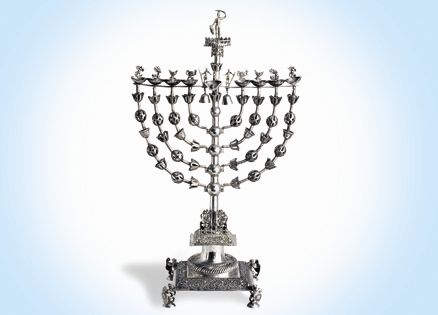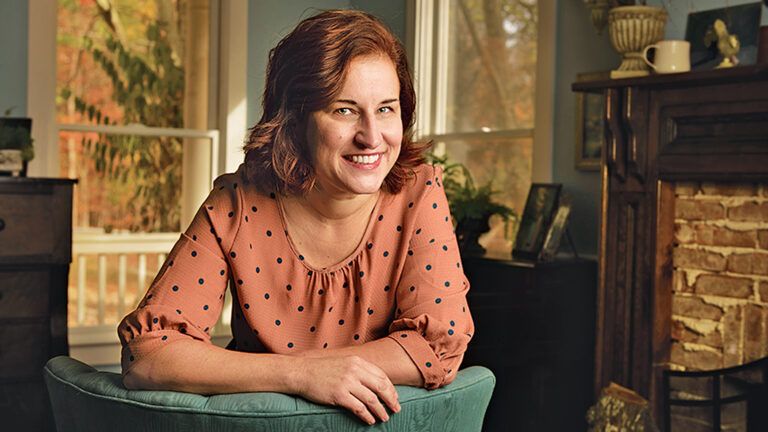I walked home through the December rain, shielding a copy of Anne of Green Gables under my coat.
This was the third time I'd renewed it at the library, and I was determined to finish the book, even though I was struggling with English. The story of a young girl adjusting to a new environment struck a chord in me, and I wanted to learn how she overcame the challenges she faced—challenges I, coming to a new country at age 13, was facing as well.
The girls at school, the language, the food—after three months in America everything still seemed foreign to me, and I found myself wishing I had something from my old life, something familiar to help me feel settled.
The Seattle streets were damp and deserted that evening in 1940. In many windows Christmas tree lights twinkled. They reminded me it was the first night of Hanukkah, the eight-day "Festival of Lights" commemorating the Jewish rededication of the Temple in Jerusalem. Mother was preparing a special meal. I picked up my pace, knowing it was almost time to light the first candle of the holiday.
My father greeted me at the door. He'd just returned from the synagogue, where he was a cantor. I heard Mother in the kitchen, grating potatoes and chopping onions to make latkes, or potato pancakes—traditional Hanukkah fare. The aroma filled our tiny apartment.
For a wonderful moment I saw our big, bright apartment in Vienna, filled with relatives on the first night of Hanukkah a few years earlier. Grandfather Mendel had set in a place of honor the beautiful silver menorah that had been crafted by my great-grandfather.
It was sturdy and graceful, solid like our family. Grandfather lit a candle, the shammes, and held it high while he recited the traditional Hanukkah blessing. Cousin Bertha put her arm around my shoulder, and my grandmother put her arm around my waist. How warm and safe I'd felt!
Then Grandfather was arrested during Kristallnacht, "the Night of Broken Glass," in November 1938, when savage mobs throughout Germany and Austria attacked Jews, ransacked their homes and businesses and set fire to synagogues. He was taken to the concentration camp at Dachau.
Grandmother died of a heart attack shortly after. Cousin Bertha escaped Austria only to be interned in a detention camp. Her fate was unclear. My parents and I fled to America, leaving behind everything. We were alive, yes, but looking around the drab apartment where we lived now, I could think only of all we'd lost. God, we are trying so hard to go on with our lives.
I sat next to Mother. She'd put away the grater, but one potato still lay on the table. "What's this one for?" I asked.
"That will be our menorah," she said, carving two shallow grooves into it.
A potato menorah? So this is what our Hanukkah ceremony has been reduced to? I turned my head so Mother wouldn't see the tear sliding down my cheek.
"What's the matter, Gina?" my father asked, squeezing my shoulder.
"I'm just a little tired, Papa," I said, mustering a smile. I wished I could lock myself in my room and lose myself in my book—and just forget about my old life.
My mother pressed a candle into the right-hand groove in the potato. Father was about to light the shammes when there was a knock on the door. He set the candle down and went to see who was there. "Special delivery," the postman announced, the brim of his cap dripping in the rain. "Sign here, please." He handed my father a worn package wrapped in brown paper.
Father brought the package to the table. It was covered with foreign stamps, but there was no return address. What could it be? Father tore away the paper and found a note addressed to him and Mother, written in German. He read aloud:
"Dear Cantor and Mrs. Schiffman,
"After Mrs. Schiffman's mother died, the concierge went to her apartment. She found a package hidden in the closet. The concierge took the package to your niece Bertha's house, just before Bertha fled to Palestine.
On the boat to Haifa, Bertha showed me that package and told me it was important. She said if she did not make it, I must mail it to the address inside. Sadly, Bertha didn't get to Palestine, but I was fortunate. I had plenty of trouble in the beginning, though. Please excuse me for this long wait.
"Respectfully yours, Bertha's Chaverah [friend]"
The three of us pried open the box and dug through the tissue paper to find…a horsehair cushion. Mother lifted it from the box and held it at arm's length, one eyebrow raised. No one said anything, and I thought Bertha's friend must have sent the wrong package. Then Father took the cushion from my mother and pressed his fingers into the bristly cloth.
"Quick, Marta!" Father exclaimed to my mother. "Get me some scissors."
He snipped open the seams of the cushion. A mass of straw fell to the floor. Then Father reached into the opening and pulled out something silver. My great-grandfather's menorah!
My parents faces went bright with joy. Deep inside me, I felt my faith shining as brightly as ever, like the nine silver branches of our Hanukkah menorah. No matter how much we had lost, God would always give us what we needed to go on.





